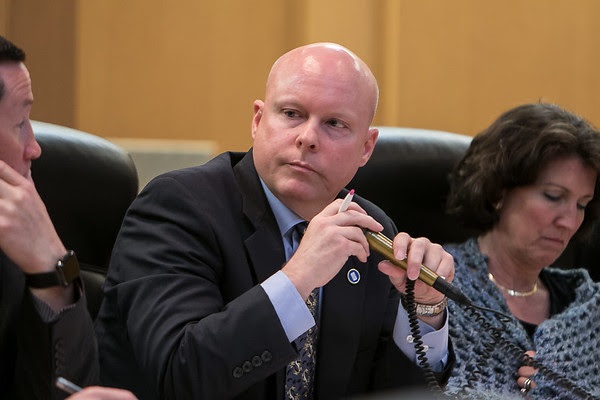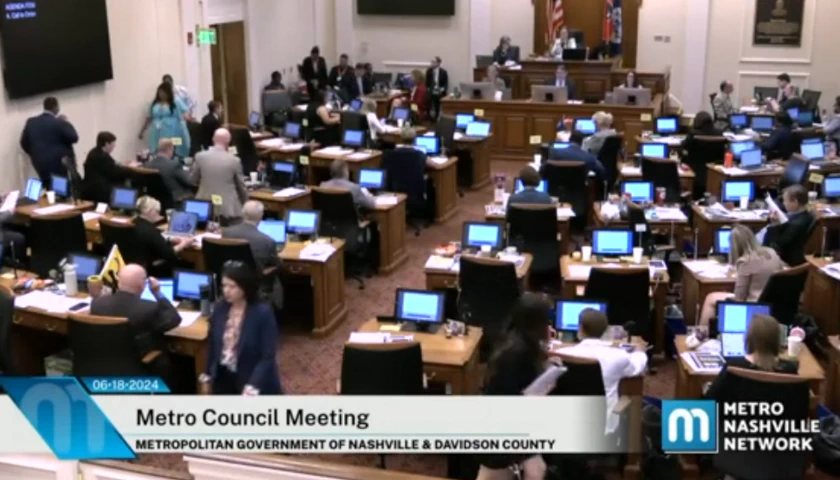While last week’s two-day House floor showdown over Governor Haslam’s 2017-18 budget never did take up an amendment for a $55 million education appropriation, HB 841, known as the K-12 Block Grant Act, was approved in a new form in the House Finance, Ways & Means Subcommittee and Committee on Monday. That approval advances the bill to the Calendar & Rules Committee meeting, which was later scheduled to Tuesday.
In full Committee, House Minority Leader Craig Fitzhugh (D-Ripley) before moving for adoption spoke very briefly on his new and only amendment to the bill, which, he stated, “takes out the funding for the bill in the way it was originally funded.”
The bill in its original form called for a one-time transfer of $250 million from a variety of revenue sources within the General Fund to the Education Fund, as The Tennessee Star reported previously.
Fitzhugh referred to the arrangement as an Education Investment Endowment Act for which a Fund (EIEF) would be created, and said “It’s much on the same premise as the Tennessee Promise,” where the reserves from the lottery have been set up as an endowment for the Tennessee Promise. Fitzhugh continued,
We are attempting to do the same thing here for K-12 education, using a fund that will become part of the Rainy Day Fund, but the earnings from it will be handled by the trustees of the revocable trust and they will go to every school district based on some qualifying factors set up by the Department of Education on an ADM, or Average Daily Membership based. It will only use the earnings from the fund. The corpus will remain eligible to be used if we need the rainy day fund.
Fitzhugh also stated about the Act, “So, it’s a start. This is the bare bones. It’s the apparatus of putting it together.”

Majority Assistant Leader David Hawk (R-Greenville), after stating that they had just received the amendment about an hour before, read two paragraphs from the fiscal note, emphasizing that the $1 million for the EIEF “will encumber these funds indefinitely and prevent use of such funds for other state purposes, unless transferred to the Revenue Fluctuation Reserve (Rainy Day Fund) as permitted by the provisions of the legislation.” Hawk concluded that he is “definitely opposed to this legislation.”
Fitzhugh responded by saying that the authorization referenced in the fiscal note is the same authorization needed for any instance of “dipping” into the rainy day fund. He also said regarding the $1 million, “As I understand it, in order to do a fiscal note if you do a bare bones structure, it is assumed for a fiscal note purposes that you will fund it. And, that’s the reason they came up with this $1 million. They picked $1 million, it could have been $100 million, or it a $150 million, which would have been a good number. But that’s the reason they did that.”
With a voice vote, the bill moved on to the House Calendar & Rules, which has been scheduled for Tuesday May 9, as is the Senate Finance, Ways & Means which will also hear the bill.
According to Governor Haslam’s 2017-18 budget document (Page A-19, Sheet 51 of 558) the state’s non-lottery appropriations to the K-12 Education Fund was $4.453 billion in 2015-16 and increased 6.7 percent to $4.751 in the current budget year of 2016-17. The appropriation for the upcoming 2017-18 budget year for the Education Fund is $4.987 billion, an increase of 4.9 percent over this year.
The fiscal note for HB 841, revised for the new amendment, assumes that the State Treasurer will administer the EIEF, holding and investing the funds until the block grants are awarded to the school systems by the Department of Education (DOE). The fund would be invested similar to the Tennessee Consolidated Retirement System, which has yielded an average 7.66 percent rate of return over the past five years.
The fiscal note originally called for two new positions to administer the K-12 Block Grant Act. The new version, dated May 8, states “The extent of administrative support and personnel needed for the DOE to administer the program is subject to the size and scope of the program.” Much like Leader Fitzhugh’s statements that “this is a start” and the “apparatus for putting it together” and that they could have picked $150 million for the fiscal note, the statement in the fiscal note appears to leave the door open for funding above and beyond the $1 million.






It’s got to be OK because it is “for the children”. Right?
Sure glad Haslam is term limited. Otherwise, he would bankrupt the state treasury with his bottomless push for education pipe dreams. But, of course, he would just figure out another way to increase our taxes to pay for his legacy. I cannot afford much more of this success. Must be nice to be super wealthy.